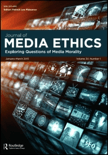
Journal of Media Ethics
Scope & Guideline
Empowering Voices in Media Ethics.
Introduction
Aims and Scopes
- Ethical Frameworks in Journalism and Media:
The journal extensively examines the ethical principles guiding journalism and media practices, focusing on issues like accountability, truthfulness, and integrity in reporting. - Impact of Technology on Media Ethics:
A significant area of focus is the intersection of emerging technologies and media ethics, particularly how digital advancements influence ethical decision-making in journalism and public relations. - Cultural Perspectives on Media Ethics:
The journal investigates how cultural contexts shape ethical considerations in media, including the influence of global and local perspectives on media practices. - Moral Development and Professional Identity:
Research on the moral development of media professionals and the formation of their ethical identities is a core theme, highlighting the psychological and educational aspects of ethics in media. - Public Engagement and Ethical Communication:
The journal emphasizes the importance of public engagement in media ethics, exploring how media can responsibly communicate with and engage diverse audiences.
Trending and Emerging
- Ethics in Digital Media and AI:
There is a growing body of research addressing the ethical implications of artificial intelligence and digital media practices, reflecting the urgent need to understand these technologies' impact on society. - Social Justice and Media Ethics:
Themes centered around social justice, equity, and representation in media are increasingly prevalent, emphasizing the role of media ethics in promoting inclusivity and addressing systemic biases. - Moral Psychology in Media Practices:
Emerging studies are focusing on the moral psychology of media professionals, exploring how personal and cultural values influence ethical decision-making in journalism and public relations. - Engagement and Dialogue in Media Ethics:
Recent trends indicate a shift towards understanding the role of public engagement and dialogue in ethical media practices, highlighting the importance of community involvement in ethical discourse. - Ethical Challenges in Crisis Communication:
Research on ethical challenges faced during crises, such as public health emergencies or political upheavals, is becoming increasingly relevant, reflecting the complexities of ethical communication in urgent contexts.
Declining or Waning
- Traditional Media Ethics:
There appears to be a decreasing focus on traditional media ethics issues, such as print journalism ethics, as the conversation shifts towards digital media and new technologies. - Legalistic Approaches to Media Ethics:
The emphasis on legal frameworks and compliance in media ethics discussions is waning, with more attention being directed toward moral philosophy and ethical reasoning instead. - Case Studies of Historical Events:
Fewer publications are examining historical case studies in depth, indicating a possible shift towards contemporary issues and real-time ethical dilemmas rather than retrospective analyses.
Similar Journals
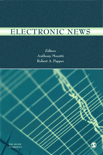
Electronic News
Pioneering Research for a Digital News Revolution.Electronic News, published by SAGE PUBLICATIONS INC, stands at the forefront of scholarly communication, focused on the dynamic intersection of media, technology, and society. With an ISSN of 1931-2431 and an E-ISSN of 1931-244X, this journal has established itself as a valuable resource for academics and professionals alike, exploring critical themes in communication and information systems. Operating from its base in the United States, Electronic News operates within a competitive landscape, boasting a commendable Q2 ranking in Communication and a Q3 ranking in Information Systems. This reflects its commitment to high-quality research and impactful insights, as evidenced by its Scopus rankings, where it ranks #238 out of 511 in Social Sciences Communication and #302 out of 394 in Computer Science Information Systems. Although currently embracing a traditional subscription model, the journal serves as a crucial platform for disseminating knowledge that shapes the future of news and media in a rapidly evolving digital age. As it converges from 2009 to 2024, Electronic News continues to invite contributions that address the multifaceted challenges and innovations of news media, making it an essential resource for researchers, practitioners, and students eager to engage with contemporary issues in communication.
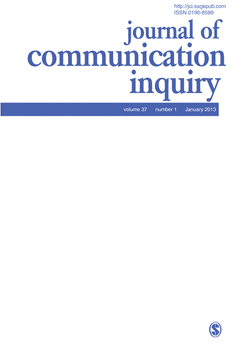
Journal of Communication Inquiry
Elevating Voices in Communication and Cultural DiscourseJournal of Communication Inquiry, published by SAGE PUBLICATIONS INC, is a premier interdisciplinary journal that serves as a vital platform for scholars and practitioners in the fields of communication, cultural studies, and the arts and humanities. With a rich history dating back to its inception in 1974, the journal has consistently upheld rigorous academic standards, reflected in its impressive rankings within the Q1 and Q2 quartiles across various disciplines according to the latest metrics. The journal's comprehensive scope encompasses theoretical and empirical research, catering to a diverse readership who are keen to explore contemporary communication issues and cultural dynamics. While the impact factor is not explicitly stated, the journal's Scopus ranks position it favorably within its categories, with notable percentiles that highlight its influence in the academic community. As an essential resource for researchers, professionals, and students alike, the Journal of Communication Inquiry invites contributions that advance the discourse surrounding communication practices and cultural phenomena, contributing to the ongoing dialogue in these evolving fields.
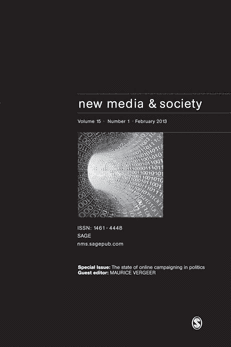
NEW MEDIA & SOCIETY
Advancing Understanding of New Media's Societal ImpactNEW MEDIA & SOCIETY is a leading academic journal published by SAGE PUBLICATIONS LTD, specializing in the dynamic interplay between new media and its impact on society. Established in 1999, the journal has become a vital resource for researchers and professionals within the fields of communication, sociology, and political science, consistently ranking in the first quartile (Q1) of its categories according to the 2023 Scopus Rankings. With an impressive percentile of 98th in both communication and sociology disciplines, NEW MEDIA & SOCIETY provides a platform for cutting-edge research that explores the complexities of digital interaction and its societal implications. Although the journal is not open access, it remains accessible through various academic institutions, making it an essential reference for students and scholars aiming to engage with the latest advancements in new media research. As the journal converges its focus into 2024, it aims to foster interdisciplinary dialogue and innovation, addressing critical issues related to digital technologies and their role in shaping contemporary society.

Theoretical and Practical Issues of Journalism
Exploring the Intersection of Theory and Practice in MediaTheoretical and Practical Issues of Journalism is a prestigious journal published by Baikal State University, that explores a broad spectrum of topics within the field of journalism. With an ISSN of 2308-6203 and an E-ISSN of 2308-6211, this journal commits to advancing the discourse in both theoretical frameworks and applied methodologies that shape contemporary journalism practices. Although it operates under an open-access model, aiming to enhance accessibility for researchers, professionals, and students worldwide, the journal does not currently display an H-index, reflecting an exciting opportunity for early career researchers to contribute to building its impact. Situated in Irkutsk, Russia, the journal serves as a vital platform for the dissemination of innovative research and critical analysis, aimed at addressing the evolving challenges in journalism today. Its scope encompasses interdisciplinary studies, media ethics, digital journalism, and the socio-political dynamics impacting the news landscape, making it an invaluable resource for anyone vested in the field. As the media environment thrives amidst rapid technological changes, Theoretical and Practical Issues of Journalism remains essential for fostering dialogue and encouraging scholarly efforts that respond to these shifts.

Journalism Studies
Fostering Critical Insights for Journalism's Next EraJournalism Studies is an esteemed academic journal dedicated to advancing the field of media and communication, and it has established itself as a leading platform for innovative research in this dynamic discipline. Published by Routledge Journals, Taylor & Francis Ltd, this journal boasts an impressive Q1 ranking in Communication in 2023, reflecting its significant impact and contributions to the field, currently holding a Scopus rank of 64 out of 511 in Social Sciences Communication, placing it in the 87th percentile. Covering a rich spectrum of topics from journalism ethics to the role of technology in news dissemination, Journalism Studies aims to foster scholarly debate and provide critical insights that shape the future of journalism. With ongoing research spanning from 2001 to 2024, it serves as an essential resource for researchers, professionals, and students seeking to enhance their knowledge and engage with contemporary issues in journalism. For those looking to stay at the forefront of media studies, this journal represents a vital source of quality research and scholarly dialogue.
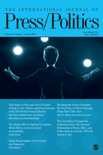
International Journal of Press-Politics
Connecting Scholars to the Heart of Press-PoliticsThe International Journal of Press-Politics, published by SAGE Publications Inc, stands as a premier scholarly platform at the intersection of communication, sociology, and political science. With a distinguished history dating back to its inception in 2003 and maintaining its relevance through 2024, this journal is recognized in the academic community for its rigorous exploration of the dynamics between the media and political processes. The journal proudly holds a Q1 ranking in both Communication and Sociology and Political Science categories, placing it in the top tier of its field, underscored by its impressive Scopus rankings, which reflect its global influence and reach. With an intention to foster innovative research and discourse, IJPP is committed to being accessible, contributing significantly to the understanding of how press and politics shape societal narratives, thus serving as an essential resource for researchers, professionals, and students alike. Explore this esteemed journal to engage with cutting-edge studies that drive the field forward.
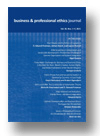
BUSINESS & PROFESSIONAL ETHICS JOURNAL
Navigating the Ethical Frontier of Business PracticesBUSINESS & PROFESSIONAL ETHICS JOURNAL, published by the Philosophy Documentation Center, serves as a premier platform for rigorous research and discourse in the realms of ethics surrounding business practices and professional conduct. Since its inception in 1979, this journal has consistently contributed to the field, encompassing vital discussions that influence ethical standards in business and economics. With a rich historical arch spanning various converged years, it has evolved to become a key resource, currently enjoying a Q4 ranking in Business and International Management and Q4 in Economics and Econometrics in 2023, alongside a strong standing in the philosophy category. While being non-open access, the journal remains an essential reference point for academics and practitioners seeking to navigate the complex ethical landscapes of their fields. As the discourse around business ethics gains importance, the journal positions itself as a critical venue for sharing innovative insights and solutions, making it an invaluable resource for researchers, professionals, and students alike.
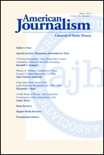
American Journalism
Innovative Insights into Journalism Practices.American Journalism is a prominent peer-reviewed journal dedicated to advancing the field of communication, with a particular focus on the evolving landscapes of journalism practices and media studies. Published by Routledge Journals, Taylor & Francis Ltd, this journal serves as a critical platform for researchers, professionals, and students aiming to explore the multifaceted dimensions of journalism from 1983 to the present. While it currently holds an impact factor ranking within the Q4 category of communication disciplines, its commitment to publishing innovative research and fostering dialogue ensures it remains an integral resource for understanding contemporary media dynamics. With its address in the heart of the United Kingdom, the journal upholds a global perspective, engaging with diverse issues relevant to today's journalistic environment. Although it does not provide open access options, the journal offers access through various academic libraries and institutional subscriptions, making it a valuable asset for anyone invested in the future of journalism.

Pacific Journalism Review
Bridging Research and Practice in Pacific Journalism.The Pacific Journalism Review, published by the Auckland University of Technology’s Creative Industries Research Institute, stands as a pivotal platform for scholarly discourse in the field of journalism and communication, particularly within the Pacific region. With an ISSN of 1023-9499 and an E-ISSN of 2324-2035, this journal has embraced Open Access since 2016, thereby enhancing accessibility and dissemination of research findings. Located in Auckland, New Zealand, it has been a critical outlet for innovative research and analysis from 2005, converging onto the contemporary landscapes of media practices through 2024. Featuring a 2023 Scopus ranking of #211 in the field of Communication, placing it in the 58th percentile, this journal is recognized for its significant contributions to the academic community, evident from its classification in the Q3 quartile. Aimed at researchers, professionals, and students alike, the Pacific Journalism Review not only enriches the discourse in communication studies but also shapes the future narratives of journalism in the Pacific and beyond.

Ethics & Bioethics
Navigating the complexities of ethics in modern society.Ethics & Bioethics is a vital interdisciplinary journal published by DE GRUYTER POLAND SP Z O O, focusing on the ethical dimensions of biological and medical practices. Since its transition to an Open Access model in 2016, the journal has become more accessible, promoting the dissemination of high-quality research to a broader audience. Based in Warsaw, Poland, this journal contributes significantly to the discourse on ethical practices in health policy, education, and philosophy, as evidenced by its impressive Scopus rankings, including a Q1 quartile in Philosophy. Covering a wide spectrum of ethical issues and dilemmas faced in contemporary society, Ethics & Bioethics provides a platform for researchers, professionals, and students to engage with cutting-edge scholarship aimed at advancing understanding and fostering dialogue in the ever-evolving landscape of bioethics. With a commitment to rigorous peer review and academic integrity, this journal is pivotal for those seeking to enhance their knowledge and contribute to the field.